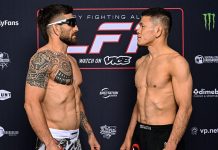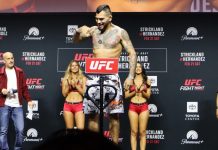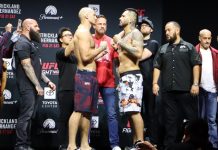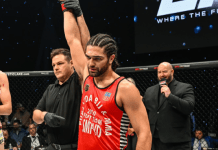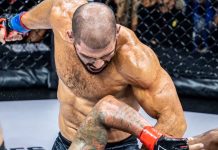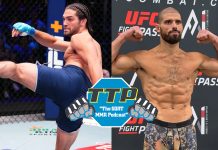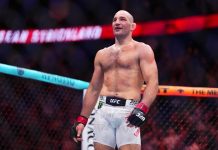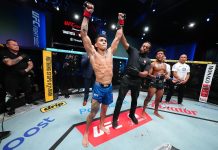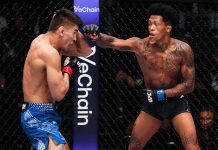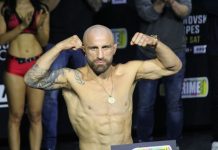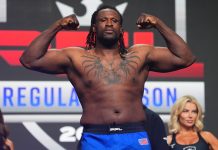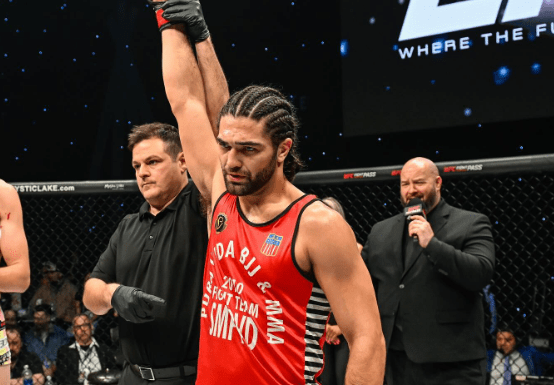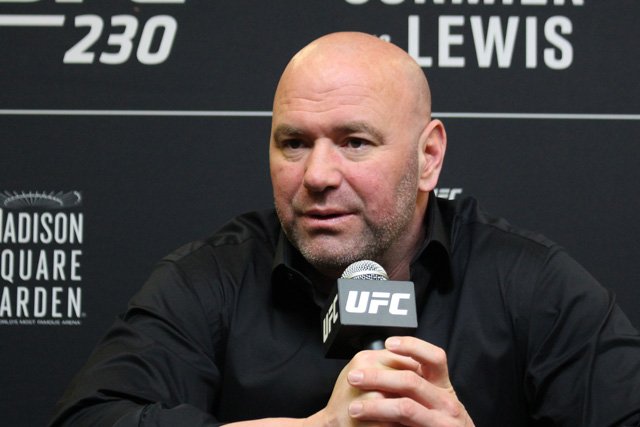
After remarks by Ben Askren, Dana White, and others at Friday’s UFC Seasonal Press Conference, EPO remains a hot topic in the MMA world.
Friday’s UFC Seasonal Press Conference in Atlanta has added another wrinkle to USADA’s drug testing of UFC athletes. During the event, which featured some of the promotion’s biggest players over the next three months, the question of EPO use in the UFC arose. It was something that wasn’t brought up directly, but rather as the result of fighters Henry Cejudo and Marlon Moraes being asked about T.J. Dillashaw’s recent multi-year suspension, after testing positive for the drug.
The pair gave the standard answers. Cejudo pointed out that Dillashaw “is paying for it,” and that he’ll have to live with his transgressions. Moraes later said he was shocked, and asked that the UFC and USADA (U.S. Anti-Doping Agency) test athletes “not just for certain substances, for all substances.”
Jumping on Moraes’ comment, it was actually UFC newcomer Ben Askren who went one step further. “Hey Dana, what do we got to do to get Mr. Novitzky to visit Marlon’s manager [Ali Abdelaziz]?” Askren questioned. “Because he said on Twitter he knows, for sure, at least five people who are using EPO. Can we send like the DEA or Novitzky or somebody over there to interrogate that man?”
White’s response was telling, although perhaps not entirely accurate. “I don’t like getting into the whole drug testing thing, I leave that up to [Jeff] Novitzky, but I was shocked that they weren’t tested for EPO,” White said in response. “That’s pretty crazy.”
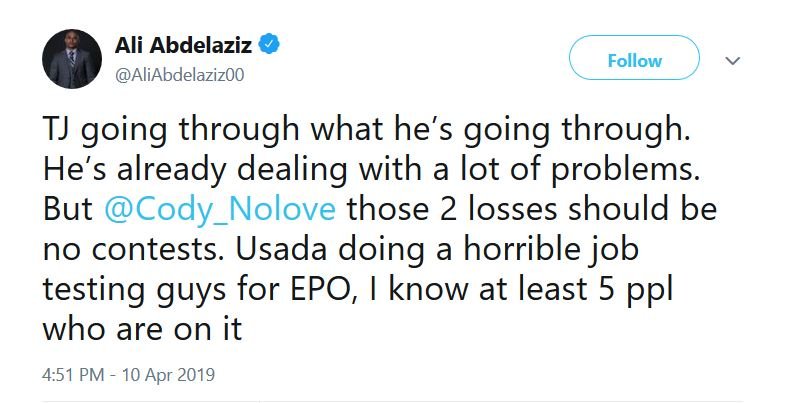
Jeff Novitzky, of course, is the UFC Vice President of Athlete Health and Performance, the man leading the charge for drug testing in the UFC. White’s comment that fighters “weren’t tested” for EPO isn’t entirely accurate, as noted. It’s just that they aren’t tested all the time. That was underlined later in the day.
Speaking in a media scrum in Atlanta, Novitzky stated that “EPO does require, it’s called a special analysis test. And it is more than a standard steroid, stimulant, other prohibited substance test that goes on.”
“It’s way more labor intensive,” he continued, noting the test takes about three days to prepare. “If a test should come back positive, another set of experts look at it. Because of that, it has increased testing costs.”
“That being said, USADA is very good about allocating those special analysis tests. If you look across our roster, I think it’s safe to say, at one time or another — and it’s all done strategically — that our fighters are tested for EPO.”
So when, then, is EPO tested for? According to Novitzky, “USADA takes a close look at what’s called the biological passport. They’re looking now, with four years of this program, they’re looking at every urine or blood marker that is the result of a test. So not only does each individual test test for prohibited substances, it also takes these markers.”
Those include the “amount of red blood cells, hemoglobin levels, certain steroid profiles in the urine,” among other markers. Those are plugged into a computer program, which “spits out those biological passports that may look a little bit suspicious. Those are the tests that they first dedicate special analysis for EPO to.”
While Novitzky couldn’t say for sure, that is likely what led to Dillashaw being tested in conjunction with his fight against Cejudo at UFC Brooklyn. However, it’s not the first time Dillashaw was tested for EPO. On Friday, Novitzky confirmed that “both of the Garbrandt fights, immediately before some point, and after, there was EPO analysis done. Those came back negative.” Dillashaw, in other words, passed.
A USADA official deferred to Novitzky on the topic of selection criteria when testing for EPO, but also told Cageside Press on Friday that “as a part of our investigation for all positives, we review an athlete’s prior test history. When it’s potentially relevant, we may request special analysis for those samples.”
In the case of Dillashaw, for example, “following our review, we conducted further analysis on his sample collected on December 28, 2018 and it also revealed the presence of EPO.”
The bottom line is that, while the system worked, it also allowed Dillashaw to slip through the cracks, initially. And that’s a concern. EPO allows the body to produce a higher red blood cell count. Which, in turn, ups the amount of oxygen the body delivers to the muscles. It has a significant impact on endurance as a result — which is a huge edge in mixed martial arts, where cardio is key. Historically, EPO is the substance that brought about the downfall of cyclist Lance Armstrong.
Keeping it out of the sport is crucial. Which brings us back to Ali Abdelaziz. The Dominance MMA President has a history of making outlandish statements, and recently claimed on Ariel Helwani’s MMA Show that someone was trying to kill him. His record in the sport speaks for itself, one way or the other.
However, after the suspension of T.J. Dillashaw, Abdelaziz, who manages Henry Cejudo among numerous other UFC stars, made his claim about knowing fighters using EPO. That’s a problem, given Abdelaziz’s stature as one of the most powerful managers in mixed martial arts. It’s why Askren brought the subject up. Ali was doing no favors by making the claims public, especially if true — given it’s a matter that should have been brought to USADA, who handle the UFC’s anti-doping program.
With luck, the controversial manager was simply trying to put some heat on the competition. However, USADA did respond to the claims, directing him to their Play Clean Tip Center if he does, in fact, have information to share. The organization cannot, of course, comment on any ongoing investigations. So whether anything comes of Ali’s statements, we may never know.
USADA could not comment on whether any changes might come to the frequency at which EPO is tested for, deferring instead to Jeff Novitzky. Novitzky did not respond to a request for additional comment.

